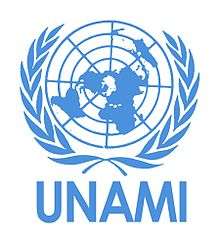United Nations Assistance Mission for Iraq

The United Nations Assistance Mission for Iraq (UNAMI) was formed by the United Nations Security Council Resolution 1500 on 14 August 2003 and supports national development efforts on political, electoral, and humanitarian levels throughout Iraq.[1][2]
History
The United Nations has been operating in Iraq since 1955 through a variety of programmes. Specialized agencies established their offices in Iraq in the early 1990s, and entities of the United Nations, such as UNAMI, have been operating in the country since the 2003 invasion of Iraq. Amid deteriorating conditions in 2007, the UN worked to progressively increase its presence in Iraq and continued to expand its operations throughout the country. The UN maintains its presence in Iraq through the Assistance Mission and the United Nations Country Team (UNCT), which regroups the 20 UN agencies currently operating in Iraq.[2] Former Special Representative of the United Nations Secretary-General Sérgio Vieira de Mello was among 22 killed in a 2003 suicide attack carried out against the United Nations. The death of the envoy who was seen as a likely candidate for Secretary-General left a lasting impact on the United Nations.[3]
Leadership
Ján Kubiš is the current Special Representative of the Secretary-General and replaces Nikolay Mladenov.[4] The current Deputy Special Representative for Political, Electoral & Constitutional Affairs is Gyorgy Busztin, who upon his appointment in 2011 replaced Jerzy Skuratowicz of Poland. Lise Grande succeeded Jacqueline Badcock in 2014 as Deputy Special Representative.
Mandate
The current mandate of UNAMI was extended to 31 July 2018, under United Nations Security Council Resolution 2367 adopted on 14 July 2017. One of its tasks is to implement the International Compact with Iraq. The Mission is mandated “as circumstances permit” and “at the request of the Government of Iraq” to:
- Advise support and assist the Government of Iraq in:
- advancing their inclusive, political dialogue and national reconciliation;
- development of processes for holding elections and referenda;
- constitutional review and the implementation of constitutional provisions;
- development of processes acceptable to the Government of Iraq to resolve disputed internal boundaries;
- facilitating regional dialogue, including on issues of border security, energy, and refugees;
- planning, funding and implementing reintegration programmes for former members of illegal armed groups;
- initial planning for the conduct of a comprehensive census;
- Promote, support, and facilitate, in coordination with the Government of Iraq:
- The coordination and delivery of humanitarian assistance and the safe, orderly, and voluntary return, as appropriate;
- The implementation of the International Compact with Iraq, including coordination with donors and international financial institutions;
- The coordination and implementation of programmes to improve Iraq’s capacity to provide essential services for its people and continue active donor coordination of critical reconstruction and assistance programmes through the International Reconstruction Fund Facility for Iraq (IRFFI);
- Economic reform, capacity-building and the conditions for sustainable development, including through coordination with national and regional organizations and, as appropriate, civil society, donors, and international financial institutions;
- The development of effective civil, social and essential services, including through training and conferences in Iraq when possible;
- The contributions of United Nations agencies, funds, and programmes to the objectives outlined in this resolution under a unified leadership of the Secretary-General through his Special Representative for Iraq;
- And also promote the protection of human rights and judicial and legal reform in order to strengthen the rule of law in Iraq[5]
Military representatives and guards
-
 Fiji - 269 Fijian troops are responsible for protecting UN buildings and staff in the Green Zone.[6] The contingent- trained, equipped and transported to Iraq by Australia- was first deployed to Iraq in December 2004, at which time it consisted of 134 troops.[7]
Fiji - 269 Fijian troops are responsible for protecting UN buildings and staff in the Green Zone.[6] The contingent- trained, equipped and transported to Iraq by Australia- was first deployed to Iraq in December 2004, at which time it consisted of 134 troops.[7] -
 Denmark - One military observer.[6] Previously, around 35 troops had been deployed as UN guards (in addition to Denmark's contribution to the US-led Coalition).
Denmark - One military observer.[6] Previously, around 35 troops had been deployed as UN guards (in addition to Denmark's contribution to the US-led Coalition). -
 New Zealand - One military observer.[6]
New Zealand - One military observer.[6] -
 Australia - Two military observers.[6]
Australia - Two military observers.[6] -
 Jordan - Two military observers.[6]
Jordan - Two military observers.[6] -
 Nepal - One military observer and 104 troops.[6]
Nepal - One military observer and 104 troops.[6]
Withdrawn Participants
-
 Romania - 100 Romanian soldiers were sent to Iraq in March 2005 for a six-month deployment in support of UNAMI[8] (in addition to Romania's contribution to the US-led Coalition).
Romania - 100 Romanian soldiers were sent to Iraq in March 2005 for a six-month deployment in support of UNAMI[8] (in addition to Romania's contribution to the US-led Coalition). -
 Georgia - Role of Georgia in the Iraq War: Around 550 soldiers were deployed in March 2005 to perform UN protection duties (in addition to Georgia's contribution to the US-led Coalition).[9] However, they were placed under U.S. command on a "middle ring security" mission in the Green Zone,[10] and were later re-deployed to join the Georgian Multinational Force Iraq contingent.
Georgia - Role of Georgia in the Iraq War: Around 550 soldiers were deployed in March 2005 to perform UN protection duties (in addition to Georgia's contribution to the US-led Coalition).[9] However, they were placed under U.S. command on a "middle ring security" mission in the Green Zone,[10] and were later re-deployed to join the Georgian Multinational Force Iraq contingent. -
 Canada - One military observer was deployed from October 2004 to July 2007.[11]
Canada - One military observer was deployed from October 2004 to July 2007.[11] -
 Austria - Had one military observer.[6]
Austria - Had one military observer.[6] -
 United Kingdom - Had one military observer.[6]
United Kingdom - Had one military observer.[6] -
 United States - Had four military observers.[6]
United States - Had four military observers.[6]
See also
References
- ↑ United Nations Security Council Resolution 1500. S/RES/1500(2003) page 1. 14 August 2003. Retrieved 2007-09-13.
- 1 2 http://www.uniraq.org/index.php?option=com_k2&view=item&layout=item&id=942&Itemid=474&lang=en
- ↑ http://www.worldpoliticsreview.com/articles/13156/diplomatic-fallout-vieira-de-mello-and-the-dark-side-of-u-n-diplomacy
- ↑ http://www.uniraq.org/index.php?option=com_content&view=article&id=85&Itemid=473&lang=en
- ↑ http://www.uniraq.org/index.php?option=com_k2&view=item&layout=item&id=1024&Itemid=636&lang=en
- 1 2 3 4 5 6 7 8 9 DPKO UN Mission's Summary detailed by Country
- ↑ "United Nations Peace Operations - Year in Review 2004". Un.org. Retrieved 2012-08-04.
- ↑ "Microsoft PowerPoint - (U) Iraq Weekly Status Report - 16 March 2005.ppt" (PDF). Retrieved 2012-08-04.
- ↑ John Pike. "Iraq Coalition - Non-US Forces in Iraq". Globalsecurity.org. Retrieved 2012-08-04.
- ↑ Press Releases, Statements & Transcripts - Embassy of the U.S. in Georgia
- ↑ Past Operations | National Defence and the Canadian Forces Archived September 8, 2007, at the Wayback Machine.
External links
- Official website (in English) (in Arabic) (in Central Kurdish)
- Iraq Inter-Agency Information & Analysis Unit Reports, Maps and Assessments of Iraq from the UN Inter-Agency Information & Analysis Unit